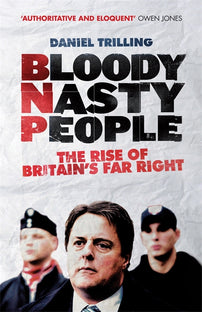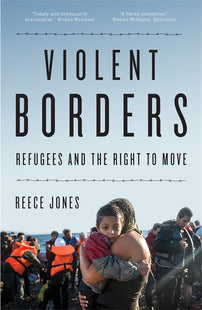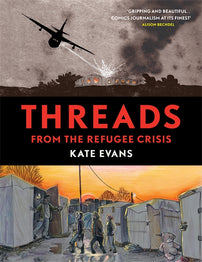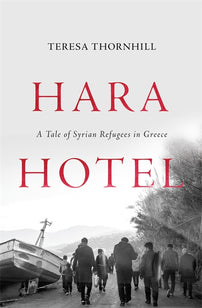Borders Are the Crisis
Who should be protected by the international system of law? Do economic migrants have the same right to entry as those fleeing war and destruction? In this episode of This is Hell! Radio, Daniel Trilling addresses these crucial questions and argues for an international framework that treats migration as a human need, rather than as a problem that can only be solved through violent state repression and militarised borders.
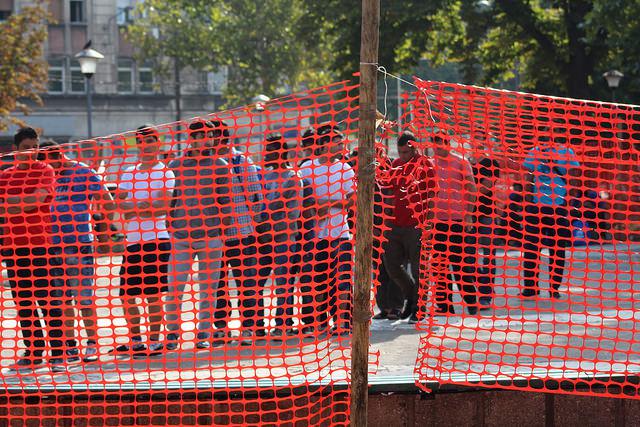
Transcribed from the 29 September 2018 episode of This is Hell! Radio (Chicago) and printed with permission. This transcript was originally published on aNtiDoTe Zine. Listen to the full interview below:
The crisis is what it’s always been, which is Europe’s treatment of unwanted migrants, which leaves people destitute and taking clandestine routes, using the services of smugglers and traffickers. And as far-right politics comes to the fore, this is going to get worse unless it’s challenged.
Chuck Mertz: Europe’s refugee crisis is far from over, and it’s far from being a refugee crisis—in reality it’s a border crisis, and Europe is pushing their border crisis on the rest of the world. Here to explain why Europe’s border crisis is not an existential threat to Europe, but it is a threat to humanity: live from London, journalist Daniel Trilling, author of Lights in the Distance: Exile and Refuge at the Borders of Europe. Daniel is an editor of New Humanist magazine and has reported extensively on refugees in Europe, winning a Migration Media Award in 2017.
Welcome to This is Hell!, Daniel.
Daniel Trilling: Thanks very much, Chuck.
CM: You had an article at the Guardian that I want to touch on, because many of the myths that you bust are many of the myths that we are hearing on a regular basis when it comes to what has been called Europe’s refugee or immigration crisis. The first myth that you undo is that the crisis is over.
What is the current state of the refugee crisis, the immigration crisis in Europe that you call the border crisis?
DT: What’s referred to as the refugee crisis peaked in 2015-16 when there was a sharp rise in the number of people coming to Europe to seek asylum, people coming from Syria but also Afghanistan, Iraq, countries in west Africa, countries in east Africa. That surge in the numbers of people traveling is now over; the number of people arriving has gone back to the levels before 2015.
But that was never really the root of the crisis. What was happening when those people were reaching Europe was that they were coming into contact with this very complex and dysfunctional border system that the EU has progressively set up over the last couple of decades to try and filter out unwanted migrants. That really broke down, and that is what was responsible for the death and chaos that we saw in those few years.
The way that European governments have responded to the crisis since 2015 has basically been to try to reestablish that existing border system, and to try and get countries outside of the European Union to act as Europe’s border cops on their behalf. The biggest example of this was the deal with Turkey that was struck in 2016, which involved Turkey agreeing to prevent Syrians and other refugees from leaving Turkish territory and traveling into the EU. But Europe has also been trying to set up deals in countries where the security situation is much more chaotic, primarily Libya. There’s been the spectacle of the Italian government in particular trying to strike deals in the last few years with whichever militias are in control of whichever towns in Libya, to try and put a stop to the people-smuggling trade there.
That’s something that’s been happening for the last couple of years, and has mainly been pursued by governments at the liberal center. The center-left government that was in power in Italy until earlier this year, for example, was already pursuing these kinds of policies. The latest change has been that now we’re starting to see far-right political parties get their hands on power in different countries in Europe, and that’s added a new intensity to what’s happening.
Again, this is most obvious in Italy, where the far-right interior minister Matteo Salvini, since he took office earlier this year, has pursued an incredibly aggressive and explicitly racist, anti-migrant policy. He’s tried to prevent NGO rescue boats from docking at Italian ports, and at the moment he’s trying to push through a whole load of anti-migrant laws in Italy that are going to strip large numbers of people of their right to asylum and their right to support from the state, all premised on the idea that they aren’t really refugees, they are people who are coming and trying to take Europe for a ride, and they’ll just go away if we treat them harshly enough.
That’s not going to happen. So the crisis is what it’s always been, which is Europe’s treatment of unwanted migrants, which leaves people destitute, leaves people taking clandestine routes, using the services of smugglers and traffickers—who might be providing a service, but at the same time might be exploiting people or exposing them to greater risk. The real risk now is that as far-right politics comes to the fore, this is going to get worse unless it’s challenged.
CM: That leads to another myth that you bust within that Guardian article, and that’s this concept of the way migrants are categorized, separated into refugees and “economic migrants.” It seems like what the Five Star government in Italy is saying essentially is that all of these people are “economic migrants,” not refugees.
Should economic migrants have the rights to entry that refugees have? After all, aren’t economic refugees simply people who are chasing money, not being chased by war? That’s the way they’re framed in media.
DT: Exactly that question has run through media and political discourse around the refugee crisis for many years now. First of all it’s important to note that the reason why those categories exist even in the abstract is quite important. There’s an international system of law set up to protect people who are displaced by conflict. The system that we have now is something that was largely established after the Second World War, and it existed to prevent a repeat of problems that we saw in the first half of the twentieth century. Even though in theory there was a system of international laws and international human rights, your rights were largely only guaranteed by your membership of a nation-state. You’re an American citizen, a British citizen, an Italian citizen and so on, and it’s your membership in that community that allows you to access rights. If people are displaced by war or persecution, are forced from their homes and suddenly have to leave—and have to do that without access to legitimate means of travel—they lose their access to all those rights and protections. In order to fix this problem, it was argued, there should be a system of international refugee law, which means that people who are effectively rendered stateless have a way to access rights and protections in countries they travel to for safety.
I personally think it’s a really important and useful system, and any critique of wider immigration policy shouldn’t discount any of that. But at the same time this framework necessarily involves making a distinction between who fits the definition of a refugee and who doesn’t, and it raises the question about people who may have traveled along similar routes but don’t meet the legal criteria for refugee protection.
That’s where this idea of the economic migrant comes into play. It’s not a legal term, it’s a highly ideological term that is used by politicians and media to imply that people who don’t meet the legal criteria for refugee protection are traveling for economic—and, the implication is, less valid—reasons.
Just to pick that apart: first of all, the way a refugee is defined under international law is actually very narrow. It only really refers to people who are fleeing specific kinds of persecution by the state (or sometimes by other groups) or who are fleeing generalized war zones. The kind of protection offered those people is often very temporary. If you’re fleeing a war, a country might say you can stay for a few years, but then your protection will expire and you’ll have to go back when the war is over.
Also, it doesn’t cover people who are forced to leave their homes by a whole lot of other factors—the huge one being climate change, but also types of severe economic hardship. If you are forced to pack up and travel thousands of miles because your kids are starving, you can’t support your family and you can’t support yourself: you are being forced to move, but you don’t qualify as a refugee under these very narrow terms. Already there, we can see the distinction between who is deserving and who is undeserving start to break down.
The story of the last few years has been one of complete policy failure; it’s one of a very nasty, racist far-right backlash that is being cultivated by certain politicians and certain sections of the media; and there are huge numbers of people—citizens, migrants, new arrivals, refugees—working together to challenge what is happening and to find ways around it and find ways to support one another.
Beyond that, though, it’s a wider question about who has the right to say where we can go and where we can’t. If we look at the history of nation-states and how the system of international borders was set up, it has always been to preserve wealth and power, and to allow freedom of movement and access to that wealth and power only to a restricted group of people.
That exercise of power is always open to challenge. States and governments may have a right to try to shape the kind of migration that happens within their borders or from outside, but it’s not an absolute right. If people have the need to move, that’s a demand that those people (and all of us, since we all need to move at some point in our lives) are making on power and making on states, and states should respond to that by shaping their laws to fit human needs rather than telling people they have to be in this or that place and stay there, and threatening them with violence if they disobey.
CM: We’ll get to that classist nature of borders in just a moment. But within the Universal Declaration of Human Rights, there is this concept that all people should have the same rights. Is the heart of the migration debate whether or not there are or should be universal rights?
DT: It certainly illuminates the incompleteness of those universal human rights, the gap between rhetoric and reality. There’s a long-standing critique of the idea of universal human rights and how the frameworks were drawn up by powerful rich countries and have never been meaningfully extended to most parts of the world. The human rights framework also doesn’t really encompass ideas of economic justice and economic freedoms; it’s always been about individual rights and freedoms. But I don’t think that’s a good reason to discount those things as principles. As with any other kind of right or freedom that we talk about, they’re there to be fought for and demanded by people, and they will always be fudged and incompletely offered by states and the people in power.
To take the Universal Declaration of Human Rights as an example to show us how things can change, in the 1948 Universal Declaration, one of the rights enumerated is the right to move within one’s own national territory unimpeded. If you’re a citizen of a particular country, you’ve got the right to go anywhere within that country, and the state hasn’t got a right to stop you traveling around. Most of us alive today would take that right for granted, but actually throughout most of recent history, over the last few hundred years, that’s been the exception rather than the norm. People’s movement has been very tightly controlled within states.
That shows that not only can a right be pushed for and won, and then embedded in our ways of living, but also that they’re always at risk. To take the UK, for example: because of the way in which the UK government has tried to strip away the welfare state, particularly in the years after the financial crisis, we’re seeing increasing restrictions on movement being applied to British citizens who are receiving certain types of benefits and welfare payments from the state. In Britain now, if you need help paying your rent and you need what’s called the housing benefit, there are now restrictions on which bits of the country you can live in. You have to live where the benefit is being paid, and you can’t travel around. So we’re already seeing the beginnings of the erosion of a right that was set down in 1948.
CM: You write about how there is not only this border crisis at the external borders of Europe, but there is a mobility crisis within Europe for, in particular, people of color: “In the autumn of 2015, public outcry over the photograph of the drowned toddler Alan Kurdi that circulated in international media pressured the British government into expanding a scheme to resettle Syrian refugees. Announcing the change, then British prime minister David Cameron talked of the country’s moral responsibility, and many politicians have invoked Britain’s ‘proud history of welcoming refugees.’ In fact, Britain’s history in the twentieth century might be better described as one of mainly trying to keep refugees out.”
To you, what explains that disconnect, whether it’s between the UN Declaration and the practices on the ground, or it’s between what Britain says and their practices on the ground—why does Britain want to portray itself as being open to refugees, but doesn’t want to accept refugees in practice? It seems like it’s a very popular thing to do, not accepting refugees, so why would they want to portray themselves in a different way?
DT: Everyone wants to be seen as the good guy and having done the right thing, and doing the right thing is often much clearer in retrospect. When we talk about the history of refugees in Britain and in Europe, the thing that looms large over that is the Holocaust and what happened in the middle of the twentieth century. Obviously, the real story of European Jews and other persecuted groups in the 1930s was that people were desperately trying to get out of Germany and other areas occupied by the Nazis, and were largely being refused access to other countries.
In the late 1930s, Britain mainly kept its doors closed to Jewish refugees, and many other countries did, too. There was a conference in 1938 at Évian where they were supposed to come up with a plan for resettling Jewish refugees, and basically every country objected for reasons like the ones we were just talking about: “Well, are they really refugees? Aren’t they economic migrants? We don’t want the ones whose culture is too alien. We want the skilled migrants who will contribute to our economy.”
In retrospect, what happened in official narratives is that people seized on the moments of hope and optimism that also existed. Everybody wants to imagine that were they in Germany in the time of the Nazis, they would be like Oskar Schindler and would have been trying to save Jews, but obviously it’s not the case that most people did that.
One of the big symbolic moments in the history of Britain in relation to this was something called the Kindertransport. In the late 1930s, as the British government was refusing in general to open its doors to Jewish refugees fleeing the Nazis, under private initiatives a campaign was brought up to bring over a certain number of children from Germany and other occupied bits of Europe, and this is now regarded as a great heroic moment where Britain intervened to save some vulnerable people.
It’s a very powerful symbol in today’s debates. Actually, one of the child refugees who was brought over as part of the Kindertransport in the late 1930s is now a Labour member of the house of lords in Britain; he’s a politician. And he’s been the figurehead of a campaign to bring over unaccompanied refugee children currently stuck in Calais in France and other parts of Europe. So every politician wants to lay claim to this myth and this narrative, and say yes, this shows how great we were in the past at bringing over refugees. But the truth is that it was a very limited kind of support, and it was the result of people campaigning against what the government was trying to do, rather than the government taking initiative.
That’s an example that comes up quite a lot in discussions. I did this talk last year where I was on a panel with a rabbi, who told me off for being too depressing about this. His take on it was that it does show the obstacles there are to protecting people and to ensuring the kinds of universal rights that we were talking about earlier, but it also shows the result of collective action: that we win these things by organizing and creating pressure.
And that’s very much the case in Europe at the moment. The story of the last few years has been one of complete policy failure; it’s one of a very nasty, racist far-right backlash that is being cultivated by certain politicians and certain sections of the media; and there are huge numbers of people—citizens, migrants, new arrivals, refugees—working together to challenge what is happening and to find ways around it and find ways to support one another.
Increasing militarization of border control has a dynamic of it’s own. When governments start acting that way, everything starts being seen as a threat. Everything starts being seen as a problem that can be solved with state violence, military technology, and more law. Unless we start tackling that, we’ll just see a repeat of these problems again and again.
CM: But as you know, neoliberalism—which is pervasive throughout Europe—is something that undermines collective action. It’s more about individual actions. How much does the current state of neoliberalism in Europe undermine the possibility for reform of their migration system?
DT: Aside from the specifics on economic policy, a large part of neoliberal ideology has been this everyone-for-themselves, dog-eat-dog attitude, promoted from the top down under Margaret Thatcher in the 1980s in Britain. It’s been the reigning ideology here and has affected the way people interact with one another in daily life.
But it’s never been the whole story. There have always been challenges to that, and people refusing to make that the way they live their lives. From the beginnings of the process in the 1980s, there was the solidarity across communities shown in the miners’ strike in Britain, and since then in lots of other ways: prolonged antiracist campaigns, for example.
But what is happening now, certainly in Britain, is that the damage caused by a generation of neoliberal economic policy, and the accompanying ideology that works against community and works against solidarity, is too hard to ignore. It’s not just in the refugee crisis that we’re seeing the effects. It’s in the huge rise in the number of people in Britain who now rely on food banks to feed themselves and their families every month. That’s something that’s been more common in the US for longer, but it’s something that’s only existed for the last few years in the UK. There’s been a huge rise in homelessness in London, where I live, that is impossible to ignore now even for people who would rather ignore it. It is leading to discussions about how we are going to change course that are coming through informal politics in some areas. That’s happening a bit in other parts of Europe, although the right has got the initiative in many places.
Also, what’s almost more important—because no political change comes without this other stuff happening on the ground first—is in the way communities have responded to the refugee crisis and the failure of European governments to do any better. We’ve seen these forms of organizing that challenge the reigning ideology and point to ways we can do better in the future. Often it’s on quite a small scale, and it’s incomplete, and it’s not sufficient at the moment, but it’s stuff that can be built from.
The example I want to use was something I saw in the south of France, on the border with Italy, where I went to do some research last summer. That border is not at the edge of the EU. It’s right in the middle of the EU. There aren’t supposed to be border controls between EU member states anymore. We’re supposed to have freedom of movement. But in order to crack down on the movement of unwanted migrants—the people coming to claim asylum who have arrived in Italy and Greece in the last few years—European governments are imposing quite explicitly racist border controls within the EU.
On the border between France and Italy, there’s a kind of mini-police state now. The French government has flooded that area with police who check the trains, check the roads, check inside vehicles, and basically check the passports of any black people they see trying to cross into France. They also apply very harsh laws to people—citizens of France, citizens of Italy—who they perceive to be giving help to the migrants. They’ve been charging ordinary men and women who live in the villages around that border with people-trafficking just because they’ve found them giving lifts to migrants to help them on to the next town or to take them to the nearest government offices where they can apply for asylum.
So what’s happened is that a huge section of that local community is basically in some kind of revolt against the state over this. A mix of young and not-so-young idealistic activists along with people who weren’t too political before, but just wanted to help people in need who they found on their doorstep, have formed networks to evade the controls that the state is trying to impose on their villages and their communities, to hand out food, to see that people who have been denied state help get access to things like medical aid, legal advice, and the rest of it. It’s based on people coming together, democratically discussing what the needs are—our needs and the needs of people around us: how do we meet those needs? How do we form networks where people work together to do it?
Those kinds of reactions to what’s been happening in Europe in the last few years are absolutely crucial and are the foundation for anything bigger that can be built on top of it.
CM: So why do you see this as a border crisis, not as an immigration crisis, not as a refugee crisis? Why do you think our focus should be on reforming the borders instead of being concerned for the plight of the immigrant and the plight of the refugee?
DT: Things like border policy should be shaped around where people need to go—and where people want to go, as well. This is a mistake that is sometimes made even with good intentions: to think that migration is all about urgent need and danger and desperation. Movement is a part of human life, and it always has been. People move out of need, but they also move out of curiosity. People want to discover other bits of the world. They want to find out about other people. They want to build new connections, build new lives, and add things to their lives and the lives of others.
Treating all of that as a problem that needs to be gotten rid of somehow or regulated into these little boxes and categories is what causes these great crises where governments have tried to filter out unwanted migrants. They discover that people keep moving anyway, but they’re now doing it in more dangerous ways, or they’re employing the use of people-smugglers, which then justifies even further crackdowns and even more violence.
Some of this is profit-driven as well; the increasing militarization of border control has a dynamic of it’s own. You’ve got a problem? Well, you need to spend millions of dollars or euros on it, and here’s all of this sophisticated military technology to help you solve it. When governments start acting that way, everything starts being seen as a threat. Everything starts being seen as a problem that can be solved with state violence, military technology, and more law. Unless we start tackling that, we’ll just see a repeat of these problems again and again.
Just to finish on that point: this is what’s happening now with the way that Europe has tried to reestablish its system of border control. It’s getting pushed further and further away from the geographic edges of Europe itself. The idea that we need to stop migrants reaching the border of the EU becomes needing to stop them from reaching north Africa, or reaching Turkey. So European money, military technology, and coercion is being established south of the Sahara desert in countries like Niger, and in west-central Africa. Money and investment is going towards extremely repressive regimes, like Sudan’s for example, in the hopes that these countries will crack down on migration heading towards Europe.
Obviously that’s going to have an immediate effect on the rights of refugees and migrants trying to make it towards Europe, but it also completely screws up what’s going on within those countries as well. The idea that there’s this unstoppable flood of migration coming from Africa towards Europe is completely false. The vast majority of migration in Africa happens within Africa; it’s people going from one African country to another. If the paradigm of border control is that we need to stop everybody moving in case some of them come to Europe, it’s going to have a very damaging effect on other societies as well. This stuff has to be challenged.
CM: You also argue that the crisis is not a “threat to European values” as the myth states according to the far right in Europe. How is migration not a threat to Europe? Won’t it change European identity and thus its culture?
We’ve had otherwise leftwing Europeans tell us online that they fear migration as a threat to European culture. So why is immigration not a threat, and why do even some Europeans on the left feel that it is?
DT: Culture and identity is change. The idea that these things are fixed and need protecting like they’re fragile objects in a museum is where the problem is. If your culture needs to be protected like that, with that level of violence and fear surrounding it, what is worth protecting in that? People rightly have questions about what our societies will look like in the future, how we’ll behave, what our habits will be, how we’ll organize our resources, and all the rest of it. But let’s have that conversation. Don’t let fear take over and shut all of that down. Because our cultures do change. That’s life. Life changes.
CM: Daniel, I really appreciate you being on the show. Enjoy your weekend.
DT: Thanks, you too.
Daniel Trilling is the Editor of New Humanist magazine and has reported extensively on refugees in Europe. His work has been published in the London Review of Books, Guardian, New York Times and others, and won a 2017 Migration Media Award. His first book, Bloody Nasty People: The Rise of Britian’s Far Right, was longlisted for the 2013 Orwell Prize. His new book Lights in the Distance: Exile and Refuge at the Borders of Europe is out now on Verso.
[book-strip index="1" style="display"]
